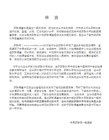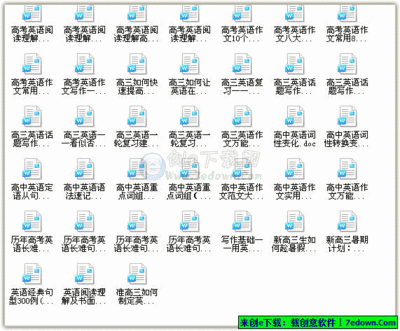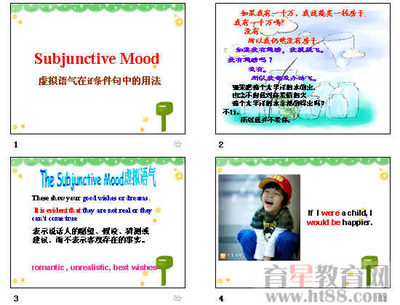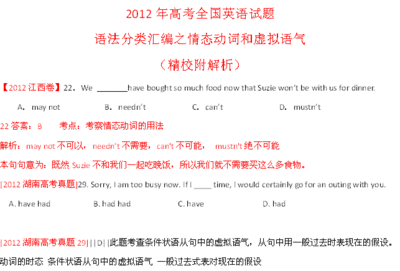条件句有真实条件句和非真实(虚拟)条件句两种。真实条件句所表示的假设是有可能发生的,而非真实条件句则通常表示一种假想,与事实相反或不大可能会发生:
If I have time, I will go with them. 假若我有时间,我就同他们去。(陈述语气)
If I were you, I would go with them. 假若我是你,我就同他们去。(虚拟语气)
▲ 与现在事实相反
若与现在事实相反,条件从句的谓语用过去式(be通常用were),主句谓语用“should (would, could, might)+动词原形”:
If I knew her number ,I could ring her up. 要是我知道她的电话号码,我就可以给她打电话了。(可惜我不知道)
▲与过去事实相反
若与过去事实相反,条件从句的谓语用过去完成时(had+过去分词),主句谓语用“should (would, could, might)+have+过去分词”:
If I’d left sooner,I’d have been on time. 要是我早点动身,我就准时到了。(但我动身太迟了)
▲与将来事实相反
若与将来事实相反,条件从句的谓语用过去式(be通常用were),主句谓语用“should (would, could, might)+动词原形”:
If I asked him,I’m sure he’d help us. 如果我向他提出要求,肯定他会帮助我们。(不过我不打算这样做)
注:几点特别说明
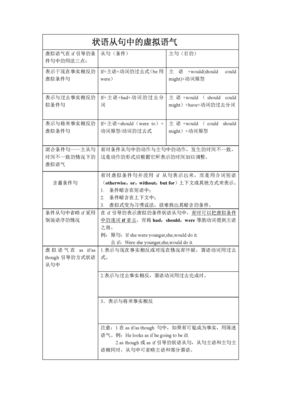
① 主句谓语中的should主要用于第一人称后。would, might, could的大致区别是:would表示结果,might表示可能性,could表示能力、允许或可能性。比较:
If you tried again ,you would succeed. 要是你再试一试,你就会成功的。(would表结果)
If you tried again, you might succeed. 要是你再试一试,你可能会成功的。(might表可能)
If you tried again ,you could succeed. 要是你再试一试,你就能成功了。(could表能力)
④ 对于与将来事实相反的情形,请注意以下几点:一是这里说的与将来事实相反,实为对将来情况的推测;二是此用法中的条件从句谓语除用过去式外,有时也用“should+动词原形”(表示可能性极小,常译为“万一”)或“were to+动词原形”(表示与将来事实相反的假设);三是当条件从句使用“should+动词原形”这样的谓语时,主句谓语除可用“should (would, could, might)+动词原形”这样的虚拟语气外,也可用直陈语气或祈使语气:
If it should rain tomorrow, don’t expect me. 万一明天下雨,就不要等我了。(祈使语气)
If I should see him, I’ll tell him. 万一我见到他,我就告诉他。(直陈语气)
2、错综时间虚拟条件句
所谓错综时间虚拟条件句即条件从句与主句所指时间不一致,如从句指过去,而主句即指的是现在或将来,此时应根据具体的语境情况,结合上面提到的三种基本类型对时态作相应的调整:
If it had rained last night, the ground would be wet now. 要是昨晚下过雨的话,现在地面就会是湿的。
You would be much better now if you had taken my advice. 假若你当时听我的话,你现在就会好多了。
3、两个常考虚拟语气句型
▲ 句型介绍
这两个句型是If it weren’t for…和If it hadn’t been for…,这是两个很常用的虚拟语气句型,也经常受到命题人的青睐,其意为“若不是(有)”“要不是有”。如:
If it weren’t for water, no plant could grow. 要是没有水植物就无法生长。
If it hadn’t been for your assistance ,we wouldn’t have succeeded.
=But for your assistance ,we wouldn’t have succeeded.
=Without your assistance ,we wouldn’t have succeeded.
5、wish后宾语从句用虚拟语气
▲ 用法说明
动词wish后接宾语从句时,从句谓语要用虚拟语气。若要表示与现在事实相反的愿望,从句谓语用一般过去时或过去进行时;若表示与过去相反的愿望,从句谓语用过去完成时或would / could+have +过去分词;若表示将来没有把握或不太可能实现的愿望,用would (could)+动词原形。如:
注:特别注意
从句的时态只与从句所指的时间有关,而与wish的时态无关,比较:
I wish I were rich. 要是我现在有钱就好了。
I wish I had been rich. 要是那时我有钱就好了。
I wished I were rich. 当时我后悔自己没有钱。
I wished I had been rich. 当时我后悔自己曾经没有钱。
6、if only后的句子用虚拟语气
if only 与 I wish一样,也用于表示与事实相反的愿望,其后所虚拟语气的时态与 wish后所接时态的情况相同:
If only she had had more courage! 她再勇敢一些就好了。
If only I had listened to my parents! 我要是当时听了父母的话就好了。
If only she would go with me! 她要是愿意和我一道去就好了!
注:if only 通常独立使用,没有主句。
7、as if (though) 从句用虚拟语气
▲ 基本用法
以as if (as though)引导的方式状语从句或表语从句,有时用虚拟语气,若表示与现在事实相反,谓语动词用一般过去时;若表示与过去事实相反,用过去完成时;表示将来的可能性不大,用would (might, could)+动词原形:
He acts as if he knew me. 他显得认识我似的。
They treat me as though I were a stranger. 他们待我如陌生人。
He talks as if he had been abroad. 他说起话来好像曾经出过国。
注:两点说明
(1) 从句所表示的内容若为事实或可能为事实,也可用陈述语气:
It looks as if we’ll be late. 我们似乎要迟到了。
(2) 注意 It isn’t as if…的翻译:
It isn’t as if he were poor. 他不像穷的样子(或他又不穷)。
8、It’s time后的从句用虚拟语气
▲ 基本用法
从句谓语通常用过去式表示现在或将来,有时也用过去进行时或“should+动词原形”(较少见,且should不能省略),其意为“(早)该干某事了”:
It’s time we went [were going, should go]. 我们该走了。
It’s time I was in bed. 我该上床睡了。(不用were)
9、would rather后句子用虚拟语气
在would rather, would sooner, would just as soon 后的that从句中, 句子谓语习惯上要用虚拟语气, 表示”宁愿做什么” ,具体用法为:
▲ 一般过去时表示现在或将来的愿望
I’d rather you went tomorrow (now). 我宁愿你明天(现在)去。
▲ 用过去完成时表过去的愿望
I’d rather you hadn’t said it. 我真希望你没有这样说过。
10、宾语从句用虚拟语气的10种类型
▲ I wish后的宾语从句
动词wish后接宾语从句时,从句谓语要用虚拟语气。若要表示与现在事实相反的愿望,从句谓语用一般过去时或过去进行时;若表示与过去相反的愿望,从句谓语用过去完成时或would / could+have +过去分词;若表示将来没有把握或不太可能实现的愿望,用would (could)+动词原形。如:
I wish I could be of some use. 我希望我能有什么用处。
We wish he didn’t smoke. 我们希望他不吸烟。
I wish prices would come down. 我希望物价能降下来。
▲ 表示“坚持”后的宾语从句
主要是指insist的宾语从句,从句谓语由“should+动词原形”构成,其中的should在美国英语中通常可以省略。如:
I insisted that he (should) stay. 我坚持要他留下。
注:动词insist后接宾语从句时,除可用虚拟语气外,也可用陈述语气,两者的区别是:若谓语动词所表示的动作尚未发生,或尚未成为事实,则用虚拟语气;若谓语动词所表示的动作已经发生,或已经成为事实,则要用陈述语气。比较:
He insisted that I had read his letter. 他坚持说我看过他的信。
He insisted that I should read his letter. 他坚持要我看他的信。
▲ 表示“命令”后的宾语从句
主要是指order, command的宾语从句,从句谓语由“should+动词原形”构成,其中的should在美国英语中通常可以省略。如:
He ordered that it (should) be sent back. 他命令把它送回去。
▲ 表示“建议”后的宾语从句
主要是指advise, suggest, propose, recommend等的宾语从句,从句谓语由“should+动词原形”构成,其中的should在美国英语中通常可以省略。如:
He suggested that we should leave early. 他建议我们早点动身。
注:与动词insist相似,动词suggest后接宾语从句时,除可用虚拟语气外,也可用陈述语气,两者的区别也是:若谓语动词所表示的情况尚未成为事实,则用虚拟语气,此时suggest通常译为“建议”;若谓语动词所表示的情况为既成事实,则要用陈述语气,此时的suggest通常译为“表明”、“认为”。比较并体会:
He suggested that we (should) stay for dinner. 他建议我们留下吃饭。
I suggested that you had a secret understanding with him. 我觉得你与他心照不宣。
▲ 表示“要求”后的宾语从句
主要是指ask, demand, require, request等后的宾语从句,从句谓语由“should+动词原形”构成,其中的should在美国英语中通常可以省略。如:
I ask that he leave. 我要求他走开。
He requires that I (should) appear. 他要求我出场。
▲ 表示“提议”“投票”后的宾语从句
主要是指move, vote等后的宾语从句,从句谓语由“should+动词原形”构成,其中的should在美国英语中通常可以省略。如:
I move that we accept the proposal. 我提议通过这项提案。
▲ 表示“敦促”后的宾语从句
主要是指动词urge后的宾语从句,从句谓语由“should+动词原形”构成,其中的should在美国英语中通常可以省略。如:
He urged that they go to Europe. 他敦促他们到欧洲去。
▲ 表示“安排”后的宾语从句
主要是指动词arrange后的宾语从句,从句谓语由“should+动词原形”构成,其中的should在美国英语中通常可以省略。如:
He arranged that I should go abroad. 他安排我去国外。
▲ 表示“希望”“打算”后的宾语从句
主要是指动词desire, intend后的宾语从句,从句谓语由“should+动词原形”构成,其中的should在美国英语中通常可以省略。如:
She desires that he do it. 她希望他做此事。
▲ 表示“指示”后的宾语从句
主要是指动词direct后的宾语从句,从句谓语由“should+动词原形”构成,其中的should在美国英语中通常可以省略。如:
The general directed that the prisoners should be set free. 将军指示释放那些俘虏。
11、主语从句中的虚拟语气
在It is necessary,important,strange,natural, advisable, anxious, compulsory, crucial, desirable, eager, essential, fitting, imperative(绝对必要), impossible, improper, obligatory, possible, preferable, probable, recommended, urgent, vital etc. ;it is a pity;It is requested/suggested/desired/proposed等结构后的主语从句中要用虚拟语气,即Should+动词原形或只用动词原形。如:
▲ It’s important…类
这一类型主要包括It is (was) important (necessary, desirable, imperative, advisable)that. . .句型。如:
It is impossible that he should go home. 他不可能会回家去。
▲ It’s a pity…类
It is a pity that she should fare so badly. 她竟吃得这么差,真可怜。
▲ It’s desired…类
这种主语从句还常用在It is (was) desired (suggested, settled, proposed, requested, decided, etc. ) that...句型。如:
It is requested that a vote be taken. 建议付诸表决。
12、表语从句、同位语从句中的虚拟语气
在advice, agreement, command, decision, decree, demand, determination, indication, insistence, order, preference, proposal, request, requirement, stipulation ,suggestion, idea,plan,order等名词后的表语从句、同位语从句中要用虚拟语气,即should+动词原形或只用动词原形。如:
Our suggestion is that you( should)be the first to go. 我们的建议是你应该第一个去。
13、 在 lest ,for fear that( 以免) , in case (以防)引导的目的状语从句中的虚拟语气
在 lest ,for fear that( 以免) , in case (以防)从句中用should+动词原形, should 可以省略.
She walked quietly lest she (should) wake up her roommates. 她走得很轻以免吵醒她的室友。
为方便记忆,表格对比
使用虚拟语气的主要句型 谓语动词的虚拟形式 例句
表现在的虚拟条件句 从句:用动词过去(be 多用were ) 1. If I were you, I should study English.
2. I would certainly go if I had time.
主句:would/should/could/might+动词原形
表过去的虚拟条件句 从句:had + PP 1. If you had taken my advice, you would not have failed in the test.
2. If I had left a little earlier, I would have caught the train.
主句:would/should/could/might +have + PP
表将来的虚拟条件句 从句:①用动词过去②should +V原③(were +to do ) 1. If it were to rain tomorrow, the meeting would be put off.
2. If you came tomorrow, we would have the meeting.
主句:would/should/could/might +have + PP
省略 if 的条件句 从句:用倒装形式,即把were,had等置于句首。(并只限were/ had)
主句:根据虚拟的情况采取与从句相应的形式。 1. Were I in school again(= If I were in school again, I would work harder.)
2. Were it not for the rain, (不能说Weren’t it for the rain, ) I would go swimming.
错综时间条件句(从句与主句所表示时间不一致) 根据从句与主句表示的不同时进行调整。 1.If you had worked hard yesterday, you would be tired now
2. If we hadn’t been working hard in the past few years, things woud be going so smoothly.
含蓄条件句(虚拟条件暗含在短语或上下文之中,从句不表现出来)(常见有but for“要不是” without等) 根据句子表达的实际情况选用相应的虚拟条件句中的主句的动词形式 1.Without air, there would be no living things.
2.I would have given you more help, but I was busy now.
名词性从句中的虚拟语气
wish, “可惜……”“……就好了”,“悔不该……”“但愿……” wish后从句:与表各种时间的虚拟条件句中的从句动词形式基本相同。
具体:1,表与现在不能实现的愿望,从句用“过去时,be 用were”
2.表与过去不能实现的愿望,从句用“had+PP 或 could/would +have +PP“
3. .表与将来不能实现的愿望,从句用“could/would +动词原形”
1.I wish I were a bird.
2. I wish I had known the answer..
would rather 后的宾语从句 would rather后从句:动词常用过去式 1. I would rather they came tomorrow
demand, insist,suggest, command, order, require, request, desire等一类动词后的宾语从句
(suggest表“暗示、隐含等”insist表“强调,力言等”不用虚拟语气。) 从句谓语用“should+动词原形”,should可省。 1. I suggest you (should)go at once.
2. He suggested that he patient’s leg should be cut and this suggested that he was not good at the case.(注意两个suggest的准确翻译)
“It is (was)+上述demand/suggest等动词过去分词(或important,natural,strange ,necessary等形容词)”后的主语从句 从句谓语用“should+动词原形”,should可省。 1. It ordered that the army (should) get there by 4 a.m.
2. It is necessary that she (should) be sent there at once.
order,suggestion,idea,plan, proposal, advice, demand等名词后的表语从句或同位语从句 从句谓语用“should+动词原形”,should可省。 His demand is that we (should )finish the work in 3 hours.
特殊形式的虚拟语气
as if 引导的从句(表示非真实时)但表真实时,不用虚拟语气。 与虚拟语气条件中从句动词形式基本相同。 1.Tom speaks as if he were a girl.
2.He looks as if he had been to Beijing.
so that, in order that引导的目的状语从句 May/might/should +V原 I live so that others may live better.
It is (the very/high)time that后的定语从句 从句谓语动词常用过去式,有时也可用should+动词原形 It is (high)time that we went (should go) to bed.
It is time that I were leaving.
省去主句的If only(要是……就好了)虚拟条件句 与wish后的宾语从句谓语形式相同。 If only I hadn’t lost the chance!
(= I wish I hadn’t lost the chance)
某些表祝愿的句子 常用原形或“May+动词原形” Long live world peace!
May you be happy1
表委婉客气的是常语句 情态动词的过去式+动词原形 Could I borrow your bike?
Would you please give me a hand?
虚拟语气的用法
虚拟语气表示一种假设的情况,或一种主观的愿望,即动词所表示的动作或状态并非事实,或不可能实现。英语虚拟语气的形式有下列几种:
一、与现在事实相反
连接词 条件从句 结果从句
If 1.动词过去式(或were)
2.助动词(过去式)+动词原形 Should
Would +动词原形
could
might
If had the time, John would make a trip to China to see the Great Wall.
If I were you, I would give up drinking immediately.
二.与将来事实相反
连接词 条件从句 结果从句
If 1. should+动词原形
2. 动词过去式
3、were to+动词原形 Should
Would +动词原形
could
might
If you should lose, what would you do?
If I were to see her tomorrow, I would tell her thetruth.
If you went there next time, you would see what I mean.
三、与过去事实相反
连接词 条件从句 结果从句
If had+过去分词 Should
Would + have+过去分词
could
might
If I’d dnown that it was going to rain, I would never have gone for a walk in the country.
四、虚拟语气的几种特殊用法
省掉if的条件从句结构:
Had you asked me, I would have told you. (=If you had asked me,…)
2.有时虚拟条件不用条件从句而用不定式、分词、介词、名词、连接词或定语从句来表示,如:
A true friend would not do such a thing.
(=If he were a true friend, he...)
(=If there were no water,…)
(=If you hadn’t helped me,…)
3. 有时条件从句中的动作和结果从句中的动作发生的时间不一致,如:
If he had followed the doctor’s advice, he would be quite all right now.
If I were you, I would have gone home.
五、虚拟语气的其他用法
1、Suggest, advise 等动词之后宾语从句须用虚拟语气,其句子结构如下:
suggest, advise, recommend, demand,
require, insist, urge, request, order, +that…(should )+动词原形
devide, ask, move, propose等
注意:在此结构中that不可省略;should省不省均可。
He suggested that they (should ) stop smoking.
上述动词的名词形式出现时,that 引导的从句仍用虚拟语气。
He made a request that they (should ) stop smoking.
如果that 引导的从句所表达的内容是事实,也可用陈述语气。
He insists that he is right.
2、It is (was )+necessary, a pity 等+that引导的从句须用虚拟语气,其句子结构如下:
imperative, advisable, 动词完成式
It is (was) + important,natural, necessary, +that…(should) +
essential, strange,等 动词原形
It is important that you (should) follow the doctor’s orders.
It is right that you should have done your homework.
3、wish的用法
动词过去式或were—与现在事实相反
主语+wish(that)+主语 + 动词过去完成式—与过去事实相反
助动词过去试+动词原形—与将来事实相反
I wish I were a pop singer. (=I am sorry I am not a pop singer..)
I wish I had never stopped teaching. (=I am sorry I stopped teaching.)
I wish they’d let us get some sleep.
注意:wish与hope接宾语从句的区别在于:hope表示一般可以实现的希望,宾语从句用陈述语气。wish表示很难或不大可能实现的希望,宾语从句用虚拟语气。试比较:
(1) We hope they will come,(We don’t know if they can come.)
(2) We wish they could come,(We know they are not coming.)
4、as if, as though, would(had) rather(that)引导的从句须用虚拟语气,如:
He acts as if nothing had happened.
I would rather you didn’t tell him.
5、It’s (high) time that…+动词过去式或should+动词原形,如:
It’s time (that) you had a hair cut.
It’s high time (that) we took some action.
练习题
1. If I ____ where he lived, I ____ a note to him.
A. knew, would
B. had known, would have sent
C. know, would send
D. knew, would have sent
2. If they ____ earlier than expected, they ____ here now.
A. had started, would be
B. started, might be
C. had started, would have been
D. will start, might have been
3. I didn't know his telephone number. ____ it, I ____ then.
A. Had I known, would ring him up
B. Should I know, would have rung him up
C. If I knew; would ring him up
D. Had I known; would have rung him up
4. Mary is ill today. If she _____, she ____ absent from school.
A. were not ill, wouldn't be
B. had been ill, wouldn't have been
C. had been ill, should have been
D. hadn't been ill, could be
5. Were I to do it, I ________ it some other way.
A. will do B. would do C. would have done D. were to do
6. I ________ him the answer ________ possible, but I was so busy then.
A. could tell, if it had been
B. must have told, were it
C. should have told, had it been
D. should have told, should it be
7. Without your help, we________ so much.
A. won't achieve B. didn't achieve C. don't achieve D. wouldn't have achieved
8. You didn't take his advice. ________ his advice, you ________ such a mistake.
A. Had you taken, wouldn't have made
B. If you had taken, would make
C. Were you lo take, shouldn't have made
D. Have you taken, won't have made
9. We wish we ____ what you did when we were at high school.
A. did B. could have done C. have done D. should do
10. She wishes she ____ to the theatre last night.
A. went B. would go C. had gone D. were going
11. Tom is very short now. His mother wishes that he ________ be tall when he grows up.
A. could B. should C. would D. were able to
12. My sister advised me that I ________ accept the invitation.
A. could B. must C. should D. might
13. He asks that he ________ an opportunity to explain why he's refused to go there.
A. is given B. must give C. should give D. be given
14. Do you think of Wang Fang's suggestion that he ________ Mr. Li to the party?
A. will invite B. have invited C. is invited D. invite
15. I insisted that he ________ at once.
A. be gone B. go C. would go D. might go
16. Li Ming insisted that he ________ anything at all.
A. hadn't stolen B. shouldn't steal C. doesn't steal D. steal
17. It is quite natural that my coming late again ________ them very angry.
A. had made B. would make C. makes D. make
18. He acted as if he ________ everything in the world.
A. knew B. knows C. has known D. won't know
19. Read it aloud so that I ________ you clearly.
A. may hear B. will hear C. hear D. have heard
20. They got up early in order that they ________ they first train.
A. caught B. will catch C. might catch D. shall catch
21. I am sorry that he ________ in such poor health.
A. are B. shall be C. were D. should be
22. That is a good book. You ________ it yesterday.
A. could buy B. should buy C. should have bought D. bought
23. It is high time we ________ home.
A. will go B. would go C. have gone D. went
24. I'd rather that you ________ home.
A. went B. have gone C. will go D. had gone
25. If only I _________ to the lecture!
A. listen B. will listen C. am listening D. had listened
26. —— If he_____, he ______ that food.
---- Luckily he was sent to the hospital immediately.
A. was warned, would not take
B. had been warned, would not have taken
C. would be warned, had not taken
D. would have been warned, had not taken
27. I didn't see your sister at the meeting. If she _________, she would have met my brother.
A. has come B. did come C. came D. had come
28. Without electricity, human life ________ quite different today.
A. is B. will be C. would have been D. would be
29. He ________ you more help, even though he was very busy.
A. might have given B. might give C. may have given D. may give
30. If city noises _______ from increasing, people _______ shout to be heard even at the dinner table 20 years from now.
A. are not kept, will have to
B. are not kept, have to
C. do not keep, will have to
D. do not keep, have to
31. Mike's father, as well as his mother, insisted that he ________ home.
A. stayed B. could stay C. has stayed D. stay
32. Mr. Smith insisted that he ________ the work all.
A. had done B. have done C. did D. so
33. Jane would never have gone to the party ________ that Mary would come to see her.
A. has she known B. had she known C. if she know D. if she has known
34. If you had enough money, what ________?
A. will you buy
B. would you buy
C. would you have bought
D. will you have bought
35. If you ________ that film late last night, you wouldn't be so sleepy.
A. didn't see B. haven't seen C. wouldn't have seen D. hadn't seen
36. Our monitor requested that ________.
A. all the class studied more carefully the problem
B. the problem was more carefully studied
C. with great care the problem could be studied
D. all the class study the problem more carefully
37. —— Would you have called her up had it been possible?
Yes, but I ________ busy doing my homework.
A. was B. were C. had been D. would be
38. His tired face suggested that he ________ really tired after the long walk.
A. had been B. was C. be D. should be
39. It is important that we ________.
A. shall close the window before we leave
B. will close the window before we leave
C. must close the window before we leave
D. close the window before we leave
40. I didn't know his telephone number, otherwise I ______ him.
A. had telephoned B. would telephone C. would have telephoned D. telephone
参考答案
1~5 BADAB 6~10 CDABC 11~15 CCDDB 16~20 ADAAC 21~25 DCDAD 26~30 BDDAA
31~35 DABBD 36~40 DABDC
 爱华网
爱华网